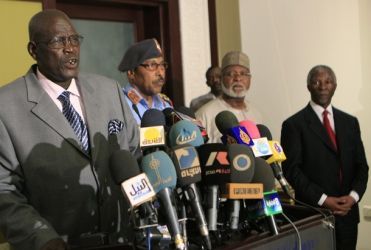Sudan and South Sudan resume security talks with no tangible progress
By Tesfa-Alem Tekle
June 22, 2012 (ADDIS ABABA) – Post-partition direct talks between Sudan and South Sudan on security issues recommenced on Friday under the mediation of the African Union High Level Panel (AUHIP) in the Ethiopian capital, Addis Ababa.

The talks on a buffer zone are deadlocked as the parties failed to endorse a map to line the demilitarised zone. Khartoum came with its map and Juba also while the mediation put something different on the negotiating table.
Prior to the resumption of bilateral talks on Friday, the mediation organised a meeting between the defence ministers of the two countries to discuss border security issues particularly the establishment of the Safe Demilitarized Border Zone (SDBZ).
Sources close to the talks told Sudan Tribune that security matters, cessation of hostilities, and constituting and assembling the Joint Border Verification and Monitoring Mechanism (JBVMM) and the formation of Ad-Hoc Committee, toped the agenda of the meeting
South Sudan foreign minister Nhial Deng Nhial told reporters that the meeting did not make any progress on the geographical extent of the buffer zone.
“We are cautiously optimistic,” he however added.
Omer Dahab, spokesperson of the Sudanese delegation, explained that the two parties also discussed the issue of support of rebel groups and ways to prevent them from having any activities outside the buffer zone.
Sudan says rebel groups carry out attacks against the government forces in Darfur and return to their alleged basis in South Sudan. Khartoum accuses Juba also of providing logistical and military support to the SPLM-North rebels.
“This is an issue which we are determined to solve and which we see as a major issue which we have to do something about,” Dahab told reporters in Addis Ababa.
He further added that the two parties reached an understanding over the activation of the JBVMM which is supposed to monitor the border.
The slow progress in the talks together with row over oil transportation fee which led to the shutdown of oil fields and the clashes over Helgig, all these things led the African Union and the United Nations to agree on the need to impose if necessary some solutions for the sake of peace.
The Sudan/South Sudan Consultative Forum (SSSCF), formerly established as the Sudan Consultative Forum which includes neighbouring countries and UN security Council permanent members discussed Friday in Addis Ababa the ongoing process between the two countries.
After hearing the mediation and representatives of the two countries, the meeting stressed on the need to abide by the deadlines (three months) as determined in the roadmap prepared by the AU and endorsed by the UN Security Council in its resolution 2046.
In a statement released Friday, the meeting further underlined that the establishment of the SDBZ, the ad?hoc Committee and the JBVMM are of utmost importance to establish border security and to monitor and investigate allegations and counter?allegations from either side.
“If the Parties could not reach an agreed compromise within the current round of negotiations, the SDBZ must be established as stipulated in the AU Roadmap and UNSC resolution 2046 (2012), in accordance with the administrative and security map presented to the Parties by the AUHIP,” the meeting provided to put a maximum of pressure on the two sides.
The statement also reiterated the position of the AU and UNSC that the map of the mediation does not affect the negotiations on the contested areas and demarcation of common border between the two parties.
The meeting are expected to continue on Saturday.
(ST)
